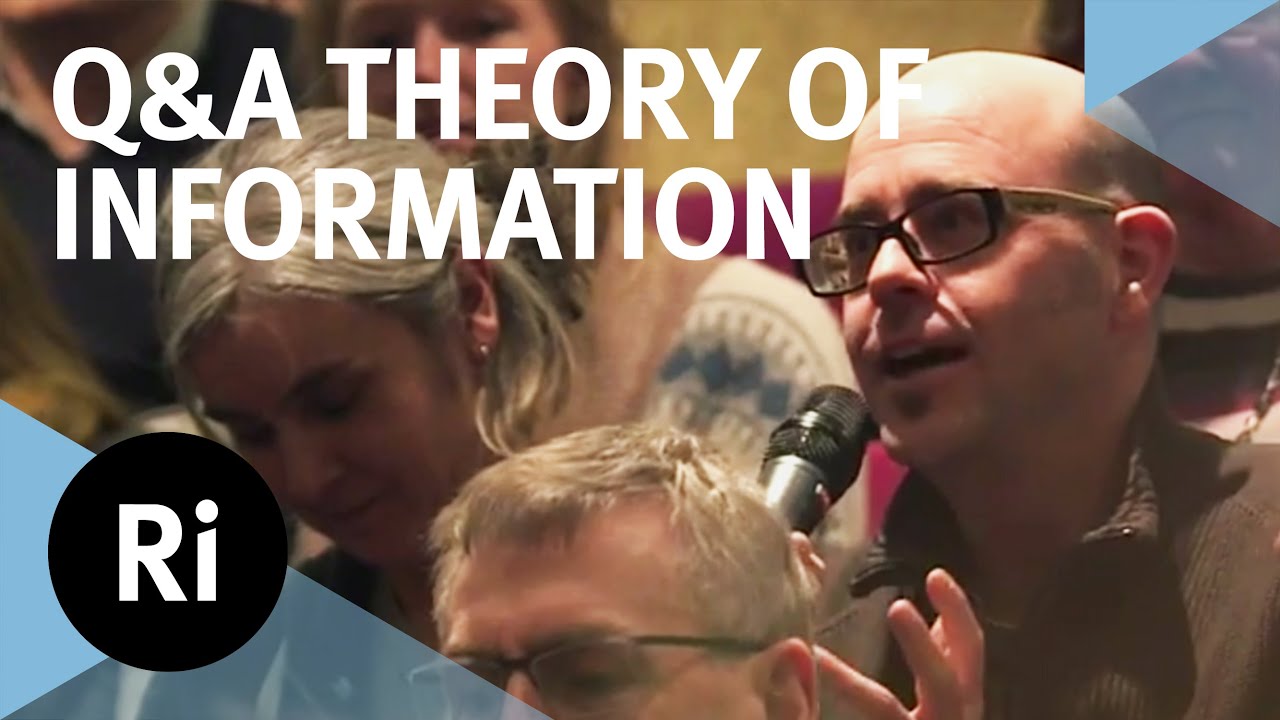The Royal Institution
How long until humans are made redundant by the evolution of technology? Is there an inherent difference between men and women’s intelligence? Daniel Dennett answers questions from the audience following his talk. Watch the main event here: https://www.youtube.com/watch?v=AZX6awZq5Z0
Subscribe for regular science videos: http://bit.ly/RiSubscRibe
The concept of information is fundamental to all areas of science, and ubiquitous in daily life in the Internet Age. However, it is still not well understood despite being recognised for more than 40 years. In this talk, Daniel Dennett explored steps towards a unified theory of information, through common threads in evolution, learning, and engineering.
The Ri is on Twitter: http://twitter.com/ri_science
and Facebook: http://www.facebook.com/royalinstitution
and Tumblr: http://ri-science.tumblr.com/
Our editorial policy: http://www.rigb.org/home/editorial-policy
Subscribe for the latest science videos: http://bit.ly/RiNewsletter
Source




yes we don't need to know everything.. i for one don't want to know the exact day of my death.
Professor Dennet, your top-down attribute to the human architect, in contrast to the down-up attribute to the termites is an assumption that you do not provide any scientific proof.
This is such a great channel! I love accessible info and science broken down for people like me. popular science is popular
But please hear and hopefully answer something that I noticed and wanted to comment on. I assume that today most any lecturer can assume an intelligent audience will include a greater variety of people than from the day most professors and doctors started their studies and career. . I noticed how the audience clapped and reacted to "We don't need to know everything". This statement sounded different to men and women after the answer he just gave. I believe he could afford to have a different approach when dealing with that question. He points out one of he's heroes, Frances Arnold in the previous video, a woman who's work is revolutionary.
I know that this mindset is changing. And even when just because of political correctness, it wouldn't harm us to recognize that a lot of the strength behind these changes comes from actual people who defy expectations and norms. As he mentioned before, evolution is smarter than us. I find this statement also backs up whatever I just said when facing the world today along with he's approach to the difference between sexes. To put it another way, i think it is possible to see how he would look at this question differently, when he would have had more female influences and heroes as well as colleagues in the same position as he, throughout he's journey to where he is now. Something he's students will have.
True! We don't have a good measure of intelligence at all. Well said.
We might be more limited than we think by "purposes" we didn't set up. May be we don't like the thought uf being determined. But if someone would do things, the motivation of which no one else understands, "we" would rather call that mad instead of "intelligent". And the history of the Christian conquista is an example of this, as also (m)any conflicts between different cultures.
great answer regarding intelligence by d.d.
it is the Halt Problem that prevent genetic algorithms from happening!
Creationism is comedy, not science.
That first answer had me absolutely in stitches. Brilliant.
Gotta love how all the neo-reactionary yt comment army jumped at him for his dismissal about men vs women intelligence.
There where more interesting parts of this talk, but this shows exactly what kind of things trigger them.
Without noticing it, they actually justified his response.
Indeed Mr. Dennet, a common source.
I have just read up the article in the book he mentioned (later on), and it's embarrassingly bad. As expected, I'm afraid, while I don't think he's incapable of logic (e.g. I liked pretty much his whole talk), it's just the typical empty posturing and "special effects" of his tradition, that ends in nothing at all. Very short too, in fact he could have given the whole argument as a short answer (but it's too silly, and just nothing).
(Basically: Zombies are a silly thing aren't they [implied that they're silly, because why not], and imagining they're "possible" doesn't mean there's a hard problem [nobody said there is a hard problem because imagining Zombies is possible]. And some other shit like that.)
(I have decided )lol, that you are wrong.
does information arise by chance…
Wow… that's.. just so very unfortunate :/ The lecture had quite a few interesting ideas and insights worth pondering, but then he started using those almost management-framework-like "graphs", choosing axis arbitrarily, assigning places of things from reality into it without any kind of concrete evidence for it, and taking conclusions from it. Then in the Q&A he starts by ridiculing a large group of people for their (admittedly ridiculous and anti-scientific) belief, but then minutes later openly admits to one such ridiculous and anti-scientific belief himself. What a mess. I guess I should've known from the moment he started citing Dawkins :/
(and for the sake of clarity, saying that any kind of measure of intelligence will be biased is not the problem, that was a very pertinent and insightful remark. The issue is that this topic is obviously of great importance to social policy-making, and so his dismissal to pursue it is instead just evidence that he doesn't like the topic and doesn't want to study it. In these cases the correct attitude from a philosopher and/or scientist is to say at the very least that they're not qualified to talk about it, preferably that they are not personally interested in the subject, and never "I think we shouldn't investigate that", because that's exactly the same obscurantism that makes people believe young-Earth creationism)
Question: How Do You Get Life from Non-Life?
If trillions of things keep bashing into each other for millions of years then virtually any possible combination will occur many times and it only takes the basic original lifeform to be created just once in some region where it can last long enough to evolve to the point of robust self-replication and thus "stand on its own two feet", as it were, and create a large enough number of descendants so that they can spread out far and wide to make it very difficult to kill all of them simultaneously. After that, life that "remembers" its history will prevail over random non-living processes. It now also has an agenda: Stay alive, at least as a first rule. Any structure with a preserved History (by any means and also have some way of being triggered into use when needed) + An Agenda = LIFE.
The problem mentioned about analog-controlled engines working at in-between values reliably if tested at nearby values (in almost every case) not working like that if using software has been already found in real engine software: The US Air Force F-16 fighter's engine had an improvement program where they were testing it, using its built-in software controls, in a test setup at a laboratory. They gradually cranked up the external wind speed of the wind-tunnel as they increased the engine power and when the engine hit the speed of sound, it instantly shut down! It turns out that the software left out an EQUAL SIGN in the equation it was using for adjusting the engine controls when inputting air speed as a fraction of Mach Number, so that the software crashed when it was at MACH 1, where a change in the equation was necessary. This also was happening to all F-16s as they passed through MACH 1 both up or down, but the time at exactly MACH 1 was so short that by the time the computer could react it was already on the next cycle where the equation worked again. Thus, a potentially lethal bug existed if somebody decided to speed up or slow down very slowly when around MACH 1, which may actually have caused F-16 crashes that were misdiagnosed as to the cause.
I've been watching countless videos on evolution and i dont see overwhelming evidence.
@17:50 the bloke who asked the question about consciousness is profoundly missing the point. Think about the experience of pain. What is it, where does it come from ? How is it possible that a mere collection of atoms can have a subjective experience like that ? Do rocks feel pain ? Light switches ? Ant colonies ? Nobody has the foggiest idea.
Dennett hypothesizes that individual neurons are unintelligent but collectively make intelligent minds. No one knows how neurons make mental experiences. He could just ask "is a whole greater than the sum of its parts?", but admit he has no idea how the parts make a whole in this case anyway! An hour of sophistry to keep up appearances.
Absolutely nothing about where information came from, just deflection when asked.
Sad.